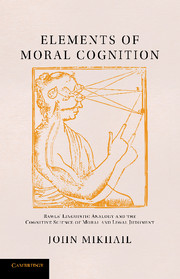 Elements of Moral Cognition
Elements of Moral Cognition Preface
Published online by Cambridge University Press: 07 September 2011
Summary
At first glance, Freud and St. Paul offer two competing accounts of human nature. On Freud's view, human beings are essentially predatory toward one another. On St. Paul's more optimistic conception, principles of justice and fairness spring from their nature as social creatures. The apparent conflict between these two familiar accounts can be reconciled, however, by means of a competence–performance distinction. Freud describes how humans often do in fact behave toward one another. Writing a decade before the most vicious mass murder machine in history was unleashed on its defenseless victims, he correctly observes that under some circumstances “men are not gentle, friendly creatures wishing for love, who simply defend themselves if they are attacked … [but] savage beasts to whom the thought of sparing their own kind is alien.” St. Paul focuses on different behaviors, however, and he also seems correct to infer from them that certain basic norms of conduct are engraved in the mind as a kind of innate instinct. This influential idea, although promoted by the Stoics and embraced by many Jewish and Christian writers, is neither exclusively Western nor inherently religious. Substantially the same notion can be found in the Hindu concept of dharma, the Confucian concept of li, and the writings of the Mu'tazilites and other Islamic rationalists, for example. Likewise, the hypothesis of an innate moral faculty is what supplies the foundation of the jus gentium or law of nations in its traditional, secular formulation.
- Type
- Chapter
- Information
- Elements of Moral CognitionRawls' Linguistic Analogy and the Cognitive Science of Moral and Legal Judgment, pp. xv - xxivPublisher: Cambridge University PressPrint publication year: 2011


